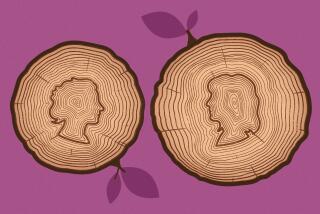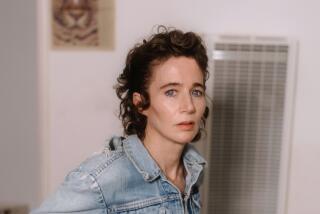Book Review : Portrait of the Artist as a Young Ms.
The Last of the True Believers by Ann Birstein (W. W. Norton & Co.: $17.95)
Remember the one-liner about the Himalayas--loved her, hated him? You might feel exactly that way about the Harveys.
Sunny Mansfield is a vital, exuberant and talented young novelist; David Harvey is the self-involved, prematurely jaded poet-professor who ensnares her with his brilliance and sophistication, both more ostensible than real.
“The Last of the True Believers” is the story of their marriage, broadening and deepening to become the emotional biography of an entire generation of spirited women who wholeheartedly believed in happily-ever-after only to discover a significant difference between fairy tale and real life.
The novel begins in 1951, Betty Crocker time, when rebelling against traditional female roles merely meant sharing a New York apartment with another girl for a year or two before settling down in the suburbs with the man in the gray flannel suit, to drive in car pools and attend committee meetings for the foreseeable future.
Settle down was the operative phrase in this scenario, implying that a woman’s personal ambition is like a helium balloon, inevitably collapsing and sinking to Earth once she’s married.
At first, Sunny hardly seems as if she’ll be an exception to the rule. She has graduated from the women’s college, moved into the cramped city apartment and applied for a literary fellowship that would take her to France for a year, all strictly according to the timetable.
Except for one critical factor: At 22, Sunny has already written and published her first novel and expects to work on her second in Europe, when she meets David Harvey at her editor’s house.
Letters From the Colony
He writes her lyrical, tender letters from the bucolic writers colony where he’s recuperating from an acrimonious divorce, and it only takes three of those before Sunny and David are lovers. Though she’s generously endowed with talent, good looks and family background, Sunny can hardly believe that this mature, worldly, handsome, almost-famous poet has fallen in love with her.
Nevertheless, she’s still determined to take up her fellowship, though when David follows her to Europe her independence starts to waver. He’s so wise, so sensitive, so adoring that she begins to think that being his muse might be the best possible use for her gifts, a notion David obviously finds congenial.
Sunny could make up for so much--David’s pinched, deprived Depression childhood, his wretched first marriage, his books that are greeted with critical accolades but public indifference.
And so, after two glorious years of love and magic, they marry and move to the Upstate New York college town where David teaches and where their daughter Sarah is born. Now Sunny has the complete ‘50s dream: the country house, the ambitious husband, the darling baby, and none of it is quite as satisfying as she had imagined it would be when she and David dined in Left Bank bistros and kissed between the Paris street lamps.
Unlike many fictional heroines of that era, Sunny wastes no time in self-pity but rents an apartment in New York, persuades David to become a reverse commuter, and takes charge of her life. Friedan, Steinem & Co. would have been proud of her.
She gets back to work on her novels, creates an identity of her own and, one by one, loses her illusions. All this takes time, but Birstein revives the familiar saga with style and wit, renews it with wonderfully tart observations on the Eastern literary-academic Establishment.
Some of these characters are actually named; others, more savagely drawn, are so thinly disguised they can easily be recognized by careful perusal of the dust jackets on their recent books.
While this chilly vision doesn’t enhance Sunny Mansfield’s deteriorating marriage, the satire will delight readers who have lived in that world and console those who may have wished they did.
After a mercifully short hiatus, Sunny’s career blooms as David’s fades. While she had managed the supporting role of celebrity’s wife with skill, David isn’t nearly so versatile an actor.
Frustration has galvanized Sunny into action and achievement, but it sours and embitters him. His epic poem unfinished, passed over for tenure at several prestigious universities, the husband of a successful wife, he bolsters his sagging image with a series of squalid love affairs.
Finally Sunny’s hand is forced and she reluctantly begins divorce proceedings.
Though all this may sound like the familiar feminist grand tour, Birstein knows the unexplored, secret corners of her territory and manages to avoid the hackneyed landmarks. Though you may know the country, revisiting it can be surprisingly rewarding.
More to Read
Sign up for our Book Club newsletter
Get the latest news, events and more from the Los Angeles Times Book Club, and help us get L.A. reading and talking.
You may occasionally receive promotional content from the Los Angeles Times.








